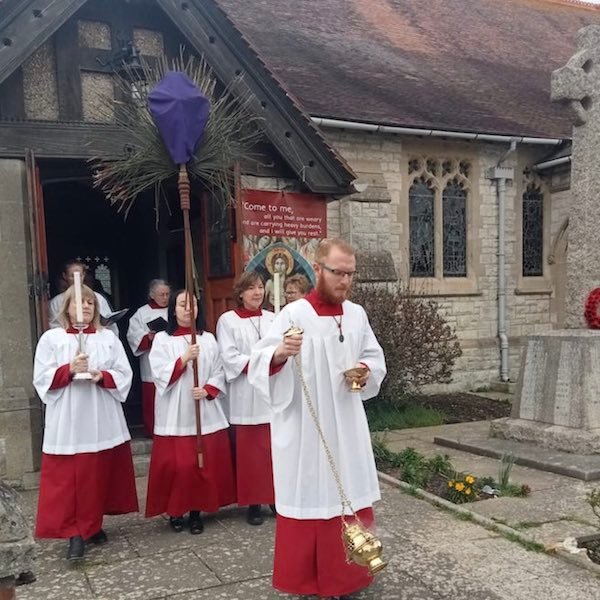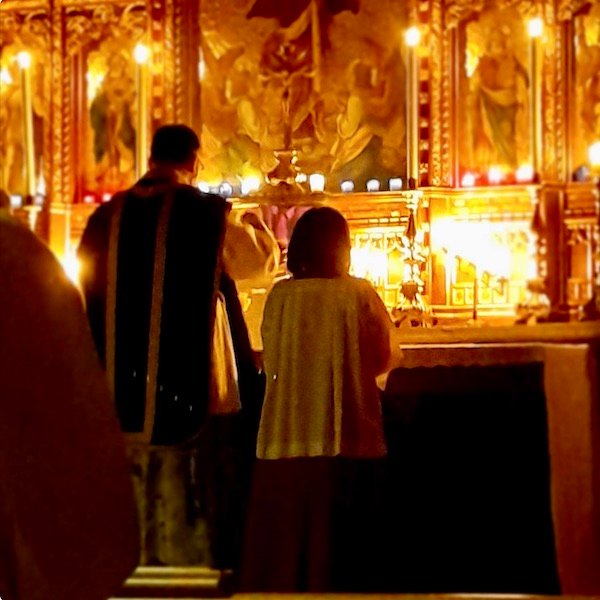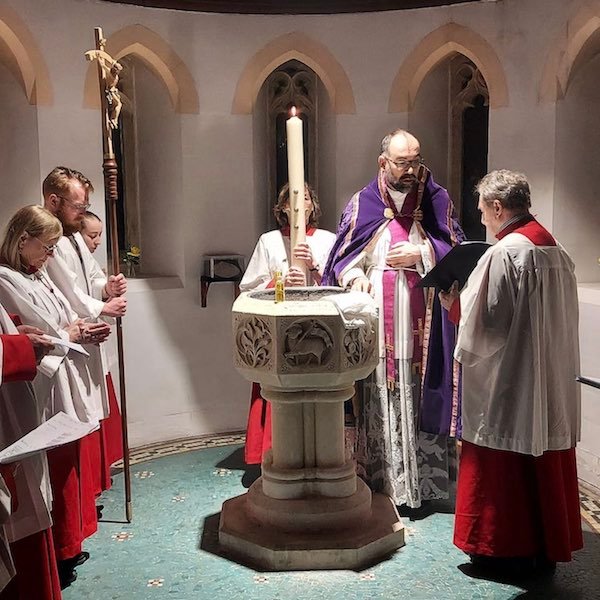
Days
This timetable of services is a general one and times can change due to special feasts and seasons. Before attending a service, please, check our weekly updates or our Calendar.
Sunday
- 9.45am - Morning Prayer
- 10.30am - Sung or High Mass
- 4pm - Evensong & Benediction
Monday
- 12pm - Low Mass
Tuesday
- 9am - Low Mass
Wednesday
- 10am - Low Mass followed by tea & coffee
Thursday
- 5.30pm - Evening Prayer
- 6pm - Low Mass
Friday
- 12pm - Low Mass
Saturday
- 9.30am - Low Mass
- 10am - Holy Rosary
Please note the above services are held at St. Paul's. For the time being, at Holy Trinity Fleet (in the "new church") there is a monthly serice of Holy Communion on the second Sunday of every month at 9am.

Seasons
At St. Paul's we follow all the traditional liturgical seasons of the Western Church. This is reflected not only in our worship but also how our church looks, feels and "sounds".
For example, in the penitential seasons of Advent and Lent vestments are purple, all flowers are removed, and the organ is used less. In Passion-tide, the two weeks preceeding Easter, statues and images are veiled as sign of mourning. Death is marked by black vestments and tapestries.
Great feasts, on the other hand, see our best vestments of gold, flowers decorate all our Altars, the bells are tolled in solemn and joyful tunes.
We commemorate God's Angels and Saints with affection - Mass is often said in their honour as we pray for their intercession. The life of each Saint inspires us to follow Christ more faithfully and we are encouraged by learning about how they overcame the same human weaknesses and difficulties we are struggling with.
Finally, the Blessed Virgin Mary, Mother of Jesus, has a special place in our Christian life. We keep all her feasts, offer special prayers to her, affectionately decorate her statues and images with flowers and light candles in her honour.
For example, in the penitential seasons of Advent and Lent vestments are purple, all flowers are removed, and the organ is used less. In Passion-tide, the two weeks preceeding Easter, statues and images are veiled as sign of mourning. Death is marked by black vestments and tapestries.
Great feasts, on the other hand, see our best vestments of gold, flowers decorate all our Altars, the bells are tolled in solemn and joyful tunes.
We commemorate God's Angels and Saints with affection - Mass is often said in their honour as we pray for their intercession. The life of each Saint inspires us to follow Christ more faithfully and we are encouraged by learning about how they overcame the same human weaknesses and difficulties we are struggling with.
Finally, the Blessed Virgin Mary, Mother of Jesus, has a special place in our Christian life. We keep all her feasts, offer special prayers to her, affectionately decorate her statues and images with flowers and light candles in her honour.

Occasional Services
Some of our services are linked to special seasons or certain days of the month/year. When these occasions occur, we always put them in our weekly updates and in the Calendar.
Anointing - the 4th Friday of every month. After the 12pm Mass two forms of prayer are offered: laying on of hands and anointing. Laying on of hands - the priest places his hands on your head and, in silence, prays for you or for the person you want him to pray for. The focus of this prayer is healing and wholeness - physical, spiritual, or mental. Anointing - this is reserved for those who are sick and frail. The priest, using the Holy Oil of the Sick blessed by the Bishop, marks with the sign of the cross the forehead and palms of the sick person so that their sins may be forgiven and their health and strenght restored.
Eucharistic adoration - the 1st Friday of every month, 10am-12pm & 5pm-7pm. The Bessed Sacrament is placed on the Altar and all are welcome to pray in Jesus' presence for as long or short a time as their day allows.
Stations of the Cross - every Firdays during Lent at 5pm. We move around the church, stopping in front of the 14 stations that mark Jesus' journey from Pilate to the tomb. We meditate on his Passion and love: what he has done to save us.
Songs of Praise - three times a year, please see the Calendar. We come together and, with a cup of tea or coffee in our hands, we sing our favourite hymns.
Carol Services - during Advent and Christmas, please see the Calendar.
Anointing - the 4th Friday of every month. After the 12pm Mass two forms of prayer are offered: laying on of hands and anointing. Laying on of hands - the priest places his hands on your head and, in silence, prays for you or for the person you want him to pray for. The focus of this prayer is healing and wholeness - physical, spiritual, or mental. Anointing - this is reserved for those who are sick and frail. The priest, using the Holy Oil of the Sick blessed by the Bishop, marks with the sign of the cross the forehead and palms of the sick person so that their sins may be forgiven and their health and strenght restored.
Eucharistic adoration - the 1st Friday of every month, 10am-12pm & 5pm-7pm. The Bessed Sacrament is placed on the Altar and all are welcome to pray in Jesus' presence for as long or short a time as their day allows.
Stations of the Cross - every Firdays during Lent at 5pm. We move around the church, stopping in front of the 14 stations that mark Jesus' journey from Pilate to the tomb. We meditate on his Passion and love: what he has done to save us.
Songs of Praise - three times a year, please see the Calendar. We come together and, with a cup of tea or coffee in our hands, we sing our favourite hymns.
Carol Services - during Advent and Christmas, please see the Calendar.
What is what...

Mass
Also called Eucharist or Holy Communion, during Mass we offer prayers to God, listen to his word in the Bible, bread and wine are consecrated ("transformed") into Jesus' Body and Blood by the priest which we then receive in Holy Communion. Mass is offered for various intentions: sick, dead, peace, healing, etc. You can always ask the priest to offer it for a person or cause important to you.
Normally modern language is used but sometimes, during the week, we use traditional language.
Low Mass: everything is said, no incense or music is used and there is no sermon. It lasts for 25 mins. approx.
Sung Mass: various parts of the Mass and traditional hymns are sung, the choir and robed servers assist the priest, incense is used, and normally there is a sermon. Sung Mass is around 50 mins.
High Mass: is exactly as Sung Mass but the priest is assisted by a robed Deacon and Subdeacon.
Normally modern language is used but sometimes, during the week, we use traditional language.
Low Mass: everything is said, no incense or music is used and there is no sermon. It lasts for 25 mins. approx.
Sung Mass: various parts of the Mass and traditional hymns are sung, the choir and robed servers assist the priest, incense is used, and normally there is a sermon. Sung Mass is around 50 mins.
High Mass: is exactly as Sung Mass but the priest is assisted by a robed Deacon and Subdeacon.

Morning or Evening Prayer
This is a simple service composed of prayers and of texts from the Bible (Psalms and Readings). Everything is said, nothing sung.
The text of both Morning and Evening Prayer is printed in the Parish Magazine and many people will use it at home as part of their daily prayers and to maintain a spiritual link with the Parish church.
Prayers are daily offered for the King, our politicians, for the world, for all those is need, for those who suffer, for our Benefactors, and for the departed.
Both Morning and Evening Prayer uses modern language (with the exception of Bible readings) and last for 15-20 mins. approx.
The text of both Morning and Evening Prayer is printed in the Parish Magazine and many people will use it at home as part of their daily prayers and to maintain a spiritual link with the Parish church.
Prayers are daily offered for the King, our politicians, for the world, for all those is need, for those who suffer, for our Benefactors, and for the departed.
Both Morning and Evening Prayer uses modern language (with the exception of Bible readings) and last for 15-20 mins. approx.

Evensong & Benediction
In reality, Evensong and Benediction are two distinct services that have been joined together in Anglo-Catholic worship.
Evensong is a sung form of Evening Prayer and just as the latter, it consists of hymns, psalms, readings from the Bible, and prayers. For Evensong we use the Book of Common Prayer and the King James Bible and so the service is in traditional language. Many Anglicans, especially older generations, will be familiar with the texts and tunes of Evensong.
Benediction is a typical service of Anglo-Catholic churches. The Host (Bread) consecrated during Mass is placed on the Altar, surrounded by candles and incense, as we believe Jesus is truly present under the appearance of Bread. This "Bread" is called The Eucharist or The Blessed Sacrament. We offer public and private prayers in front of The Eucharist at the end of which the priest blesses all those present, and the whole parish, with the Sacrament.
Evensong is a sung form of Evening Prayer and just as the latter, it consists of hymns, psalms, readings from the Bible, and prayers. For Evensong we use the Book of Common Prayer and the King James Bible and so the service is in traditional language. Many Anglicans, especially older generations, will be familiar with the texts and tunes of Evensong.
Benediction is a typical service of Anglo-Catholic churches. The Host (Bread) consecrated during Mass is placed on the Altar, surrounded by candles and incense, as we believe Jesus is truly present under the appearance of Bread. This "Bread" is called The Eucharist or The Blessed Sacrament. We offer public and private prayers in front of The Eucharist at the end of which the priest blesses all those present, and the whole parish, with the Sacrament.

Holy Rosary
Holy Rosary is an ancient prayer with a simple structure. The Lord's Prayer (Our Father) and the Hail Mary are repeated as we meditate on the life events (called "mysteries") of the Lord Jesus.
Joyful Mysteries - 1) Mary, overshadowed by the Holy Spirit, concieves in her womb the Son of God: Jesus; 2) The first sharing of the Good News: Mary visits her cousin, Elizabeth; 3) Mary gives birth to Jesus, our Saviour; 4) After 40 days from Jesus' birth, Mary takes him to the Temple of Jerusalem to offer him to God; 5) Mary and Joseph find the Child Jesus, the Eternal Widsom, in the Temple teaching the Priests.
Sorrowful Mysteries - 1) The agony of Jesus in the Garden of Getsemani; 2) Jesus is scourged; 3) Jesus is crowned with thorns; 4) Jesus carries the Cross; 5) The Lord Jesus is crucified and dies for us.
Glorious Mysteries - 1) Jesus rises from the dead, victorious over sin and death; 2) Jesus ascends into heaven; 3) Jesus send the Holy Spirit; 4) Mary, at the end of her life, falls asleep and is taken up in heaven, body and soul; 5) Jesus crowns Mary as Queen of Heaven and Earth.
Joyful Mysteries - 1) Mary, overshadowed by the Holy Spirit, concieves in her womb the Son of God: Jesus; 2) The first sharing of the Good News: Mary visits her cousin, Elizabeth; 3) Mary gives birth to Jesus, our Saviour; 4) After 40 days from Jesus' birth, Mary takes him to the Temple of Jerusalem to offer him to God; 5) Mary and Joseph find the Child Jesus, the Eternal Widsom, in the Temple teaching the Priests.
Sorrowful Mysteries - 1) The agony of Jesus in the Garden of Getsemani; 2) Jesus is scourged; 3) Jesus is crowned with thorns; 4) Jesus carries the Cross; 5) The Lord Jesus is crucified and dies for us.
Glorious Mysteries - 1) Jesus rises from the dead, victorious over sin and death; 2) Jesus ascends into heaven; 3) Jesus send the Holy Spirit; 4) Mary, at the end of her life, falls asleep and is taken up in heaven, body and soul; 5) Jesus crowns Mary as Queen of Heaven and Earth.
Commonly asked questions:
- Would I be welcome at your services? Absolutely yes. Everyone is welcome regardless of their... well, just anything really.
- What is the style of your worship?
- Any dress code?
- Are children welcome?
- What should I expect if I come to you?
- Will I be able to follow your services?
- I have more/different questions...
